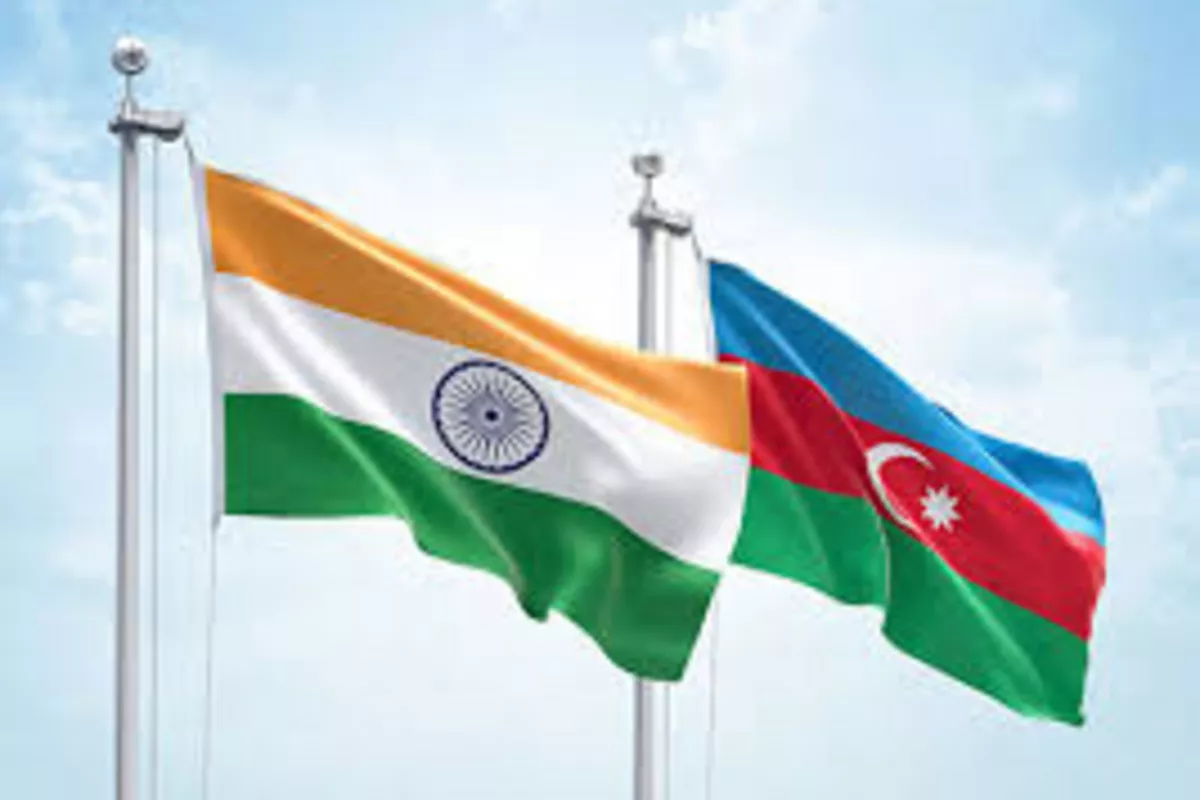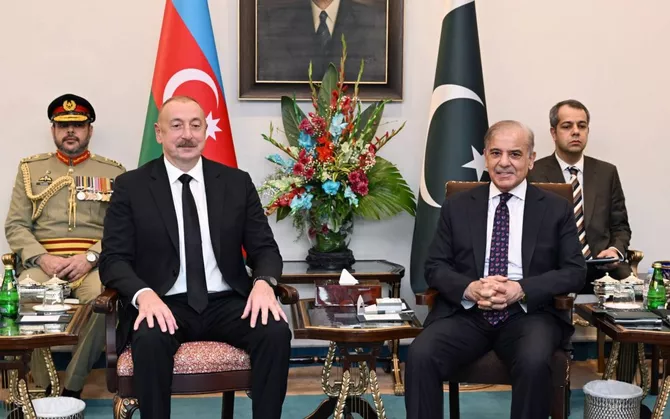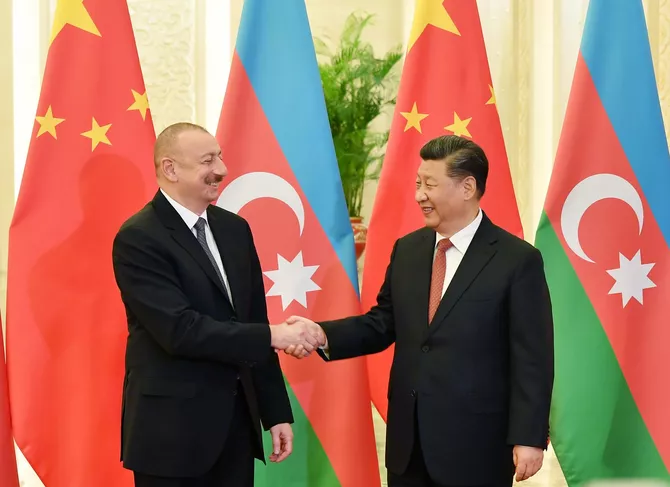
In the Chinese city of Tianjin, on the sidelines of the Shanghai Cooperation Organization (SCO) summit, a meeting took place between President of Azerbaijan Ilham Aliyev and Prime Minister of the Islamic Republic of Pakistan Muhammad Shehbaz Sharif.
The main emphasis in the report on the talks was the signal addressed to the Indian side. Ilham Aliyev stressed that New Delhi seeks to retaliate against Azerbaijan on international platforms because of its unwavering support for Pakistan. However, for Baku, such behavior is of little consequence - the fraternal ties with Pakistan remain an unconditional priority.

Azerbaijan is already a dialogue partner in the SCO and had previously expressed its intention to upgrade its status to that of an observer. This step would be a natural development, as Azerbaijan maintains strong relations with all SCO member states except India. In fact, Azerbaijan is objectively a valuable and in-demand partner for the entire SCO space, and therefore formalizing its status does not play a decisive role: cooperation with regional states will continue regardless of New Delhi’s decisions.
Back in 2022, when Ilham Aliyev first attended the SCO summit, Baku was aware that India might obstruct Azerbaijan’s progress. However, this did not cause serious concern at the time - Azerbaijani diplomacy made no attempts to “appease” the Indian side.
The situation appears paradoxical: there have never been either sharp contradictions or close rapprochement between India and Azerbaijan. There are no large-scale economic projects, nor are there points of direct rivalry. Nevertheless, New Delhi has developed a biased attitude toward Azerbaijan that lacks a rational foundation. Azerbaijan’s support for Pakistan has always been explained by fraternal ties and has never had an anti-Indian dimension. Yet India has chosen to view Azerbaijan as an opponent, showing a lack of diplomatic flexibility.
In Tianjin, India once again demonstrated its hostility by blocking the issue of Azerbaijan’s membership in the SCO. This step was predictable. In his conversation with the Pakistani prime minister, Aliyev specifically pointed to such examples of New Delhi’s peculiar policy. India uses its veto right as a tool of pressure, as it has no other levers of influence over Azerbaijan.
It is important to emphasize, however, that SCO status cannot undermine Azerbaijan’s real positions. The country remains a key partner in the region even without formal membership.
In fact, India acted against the very essence of the SCO and its fundamental principles - the so-called “Shanghai Spirit.” This spirit is based on mutual trust, equality, cooperation for mutual benefit, respect for partners’ interests, the promotion of multiculturalism, and common development. As China has repeatedly stressed, the “Shanghai Spirit” is the root and soul of the organization, reflecting the member states’ aspiration for stability and unity. By using a multilateral platform to settle scores, India violated these norms.

Moreover, New Delhi’s decision ran counter to the interests of China, which consistently supports Azerbaijan’s accession to the SCO. During talks with Aliyev, Chinese President Xi Jinping confirmed Beijing’s readiness to back Azerbaijan’s membership, stressing that China is determined to actively cooperate with Baku on a multilateral basis in the interests of the Global South and in building a community with a shared future for humanity. India, by contrast, showed that personal ambitions matter more than global interests.
The situation should not be reduced exclusively to the Pakistan factor. Pakistan is a strategic ally of China and receives extensive support from Beijing, including in the military sphere. Furthermore, China participates in the resolution of water disputes between India and Pakistan. Yet India cannot afford open confrontation with China: New Delhi is forced to take into account China’s weight, especially under pressure from the United States. It is telling that the administration of Donald Trump imposed punishments on India but refrained from similar measures against China.
There is also an Armenian dimension to India’s anti-Azerbaijani stance. This is not due to any particular closeness between New Delhi and Yerevan, but rather the active work of Armenian circles against Baku in various forums. It is notable that only on September 1, 2025, did Pakistan recognize Armenia and establish diplomatic relations with it. Before that, the Armenian side had actively campaigned against Islamabad, and India became a convenient channel for continuing this line. As a result, in trying to accommodate Armenian narratives, India paradoxically put Yerevan itself in a difficult position. By blocking Azerbaijan, it forced Pakistan to take a mirror position and oppose Armenia’s membership in the SCO.
Armenia, meanwhile, has recently tried to present itself as a more significant player on the international stage. The latest agreements in Washington gave Prime Minister Nikol Pashinyan a certain visibility that he previously lacked. Yet India’s actions undermined this fragile balance. It is clear that when discussing membership in organizations of such magnitude, preference cannot be given to one side of a conflict - diplomatic logic requires equilibrium.
Thus, New Delhi, which aspires to the role of a global power, has ended up being driven by its own emotions. Instead of contributing to a peaceful dialogue between Baku and Yerevan, India has chosen to indulge in petty ambitions.
Meanwhile, Azerbaijan and India have no grounds for rivalry. Their relations have developed sporadically and could have acquired greater substance in the context of the rapid growth of Eurasian infrastructure projects. However, India, moving along its current trajectory, is consciously closing off these prospects for itself.
Even if Azerbaijan does not become a member of the SCO right now, its influence in the region and its role within the organization will remain unchanged. India cannot alter this reality, because Azerbaijan’s strength lies not in formal statuses but in its unique geographical position, transport and energy potential, and partnerships with leading regional powers. Baku has already established itself as a crucial link between East and West, North and South, playing a key role in strategic projects and shaping new routes of cooperation. For this reason, Azerbaijan will continue to be a sought-after and influential actor, regardless of New Delhi’s political decisions.
By Tural Heybatov
Share on social media